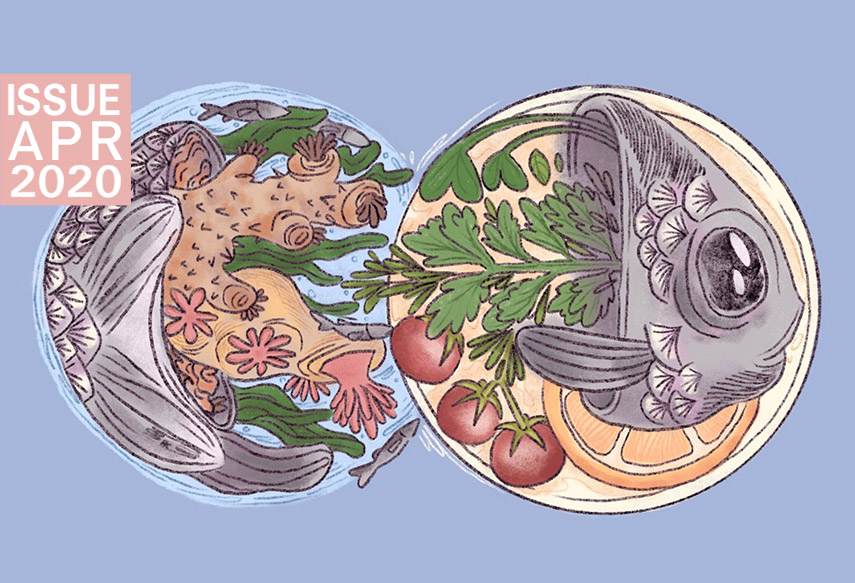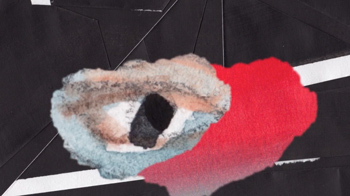- Featuring
- Anton Chekhov
- Phan Nhiên Hạo
- Matteo Meschiari
- Chus Pato and Alba Cid
- Polyphonic Experiments
- Joshua Craze on António Lobo Antunes
Looking for “the figure in the carpet”? Find it in “A Primal Design,” Asymptote’s Spring 2020 edition, featuring new work from 30 countries and 24 languages. Our stunning roster includes Oscar winner Volker Schlöndorff—who adapted The Tin Drum for the silver screen, Tove Jansson of Moominland fame, and writers in exile Tsering Woeser and Phan Nhiên Hạo. Anton Chekhov’s Cherry Orchard graces our drama section alongside hidden gems from the late translation theorist Henri Meschonnic, while a pair of sonic-visual projects explore the “post-medium condition.” Finally, to help you conquer fear and confinement, seek answers to the grand questions in this issue’s Galician Poetry Feature!
Answers may not always be apparent, as in Pakistani author Mirza Athar Baig’s titular “Junkshop,” in which the narrator muses on the heroic destinies of objects, known and unknown. Yet when great beasts roamed the land, there were not yet such stories: Italian writer Matteo Meschiari’s “Red Ivory” plumbs those primeval depths. Critic Robin Munby finds mystery in another animal, the bee, “a palimpsest, overlaid with meaning” throughout Hamid Ismailov’s novel from the Uzbek, Of Strangers and Bees. Elsewhere, Jennifer Manoukian discusses the “New Novel” according to Armenian author Zareh Vorpouni, whose similarly honeycombed narratives ask whether testimony also contains an element of fictionalizing construction. Stories and their meanings are inevitably multiple, like origins.
Perhaps these origins can be accessed via deeper awareness of our surroundings, through turning inward and becoming one’s own subject in Abd al-Qāder Bīdel of Delhi’s “realm of rich sufficiency.” Then, listening to the stones, as Galician poet Eva Veiga recommends, one might “decipher / what the water says, / what time says.” These Galician poets maneuver in an oracular gravity informed by a kind of animism, as though everything might speak, in Chus Pato’s words, “like petals on a corolla / speech too radiates from the signs.” Ismael Ramos sees just such a sign in his mother rubbing a peach against her leg: the gesture, purely poetic, is “devoid of function,” yet somehow expressive, pregnant with meaning.
This poetic gesture quintessentially relies on pattern, like multimedia artist Simona Năstac’s animated raindrops or tears, or Pedro Lemebel’s “ornamented, baroque” chronicles, “so inflected with the micro-dialects as to seem to exist nowhere else in the world.” Nano Shabtai’s The Anchorman’s Son also reflects an interest in iterative patterning, except via internal rhyme, brilliantly imported in Mitch Ginsburg’s translation. Meanwhile, Auschwitz survivor Edith Bruck hammers home the anaphoric decrees of fate: “To be born by chance / To be born a woman / To be born poor / To be born Jewish…” only to conclude with pathos: “It’s too much / For a single life.” You’ll never hear the complaint “Too much!” here at the magazine; we rejoice in surfeit, and in the rich palette of guest artist Ishibashi Chiharu.
Asymptote, which has been practising social distancing forever, continues to champion translation in troubled times, including in our new weekly column In This Together: Writers From Around the World Respond to the COVID-19 Outbreak. In Fiona Bell’s vision of translation, the translator is a diva: without the opera’s vocal interpreter, there is no access to any original. Thus each work has its diva, but without her audience, the diva cannot exist. Consider expressing your appreciation for these great performances by making a one-time donation of any amount, or by signing up as a sustaining member from as little as $5 a month. You can also support Asymptote by subscribing to our monthly Book Club, now open to the entire world. Follow every rising star by signing up for our newsletter, and be the first to get apprised of our soon-to-be-announced translation contest by following us on Facebook and Twitter. As always, we are proud to be your man behind the curtain bringing you the best in world literature from across the globe. Thank you for cheering us on.
—Lee Yew Leong, Editor-in-Chief
Editorial Team for Issue April 2020
Editor-in-Chief: Lee Yew Leong (Taiwan/Singapore)
Assistant Managing Editors: Daljinder Johal (UK/India) and Josefina Massot (Argentina)
Section Editors:
Lee Yew Leong (Taiwan/Singapore)
Garrett Phelps (USA)
Varun Nayar (India)
Caridad Svich (USA/UK)
Ah-reum Han (USA/South Korea)
Sam Carter (USA)
Eva Heisler (USA)
Henry Ace Knight (USA)
Editor of Special Feature on Galician Poetry: Lee Yew Leong (Taiwan/Singapore)
Assistant Editor of Special Feature on Galician Poetry: Jacob Rogers (USA)
Assistant Editors: Edwin Alanís-García (USA), Alyea Canada (USA), (Canada), Whitney DeVos (Mexico/USA), Helena Fornells (UK), Barbara Halla (France), Marina Martino (UK), Maya Nguen (USA), Erik Noonan (USA), Andreea Scridon (UK/Romania), Lindsay Semel (Portugal/USA), P. T. Smith (USA), Jay G. Ying (UK), and Lin Chia-wei (Taiwan)
Contributing Editors: Ellen Elias-Bursac (USA), Aamer Hussein (UK), Sim Yee Chiang (Singapore), Dylan Suher (USA), and Adrian West (USA)
Translation Tuesdays Editor: Edwin Alanís-García (USA)
Art Director: Lee Yew Leong (Taiwan/Singapore)
Assistant Director, Educational Arm: Barbara Thimm (USA/Germany)
Editors-at-large, Argentina: Allison Braden and Sarah Moses
Editor-at-large, Brazil: Daniel Persia
Editor-at-large, El Salvador: Nestor Gomez
Editor-at-large, Guatemala: José García
Editors-at-large, Hong Kong: Jacqueline Leung and Charlie Ng Chak-Kwan
Editor-at-large, Iran: Poupeh Missaghi
Editors-at-large, Mexico: Andrew Adair and Paul Worley
Editor-at-large, Morocco: Hodna Nuernberg
Editor-at-large, Peru: Paloma Reaño
Editor-at-large, Romania and Moldova: MARGENTO
Editor-at-large, Slovakia: Julia Sherwood
Editor-at-large, Taiwan: Vivian Chih
Editor-at-large, Tibet: Shelly Bhoil
Editor-at-large, Uzbekistan: Filip Noubel
Editor-at-large, Vietnam: Quyen Nguyen
Masthead for Issue April 2020
Fiction: Lee Yew Leong
Poetry: Garrett Phelps
Nonfiction: Varun Nayar
Drama: Caridad Svich
Criticism: Sam Carter
WoW: Ah-reum Han
Special Feature on Galician Poetry: Lee Yew Leong with assistance from Jacob Rogers
Visual: Eva Heisler
Interviews: Henry Ace Knight
Illustrations and Cover: Ishibashi Chiharu
Assistant Managing Editor (supervising Assistant Editors): Josefina Massot
Assistant Managing Editor (supervising Editors-at-Large): Daljinder Johal
Communications Director: Samuel Kahler
Director of Outreach: Alessandro Mondelli
Chief Executive Assistant: Samuel Miller
Senior Executive Assistant: Bernice Seow
Executive Assistant: Austyn Wohlers
Blog Editor: Xiao Yue Shan
Assistant Blog Editors: Rachel Allen and Sarah Moore
Newsletter Editor: Rita Horanyi
Guest Artist Liaison: Berny Tan
Chief Copy Editor: Steven Teref
Senior Copy Editors: Devarati Chakrabarti and Angela Glindemann
Copy Editors: Anna Aresi, Andrea Blatz, Bella Bosworth, Choo Suet Fun, Rose Green, Sophie Hoffman, and Clayton McKee
Technical Manager: József Szabó
English Social Media: Scarlett Castillo, Georgina Fooks, Rita Horanyi, Nina Livelo, and Sarah Panfil
Spanish Social Media: Sergio Serrano
French Social Media: Filip Noubel
Chinese Social Media: Jiaoyang Li and Jessica Wang
Graphic Designer: Anna Wang
Communications Managers: Alexander Dickow and Georgina Fooks
Assistant Director, Educational Arm: Barbara Thimm
Educational Arm Assistants: Kasia Bartoszyńska, Lucchini Clémence, Mary Hillis, Kent Kosack, Clare Spaulding, and Ian Thompson
Asymptote would like to acknowledge the support especially of:

as well as their respective representatives Rosario Álvarez and Valentín García Gómez, without whom the Galician Poetry Feature could not have happened. We are also grateful for the additional support from Editorial Galaxia's Francisco Castro.
For their generous donations, our heartfelt thanks go too to Yvonne Koh, Chris Tanasescu, Anna Aresi, Daniel Hahn, Gina Caputo, Jeffrey Boyle, Justin Briggs, Katarzyna Bartoszynska, Lara Norgaard, Mallory Truckenmiller, Marilya Veteto, Mark Cohen, Martin Ingebrigtsen, Mary Olivanti, Matthew Mazowita, Michaela Jones, Monty Reid, Nancy Relaford, Ruth Diver, Siobhan Mei, Velina Manolova, and Xiangxiu Meng.
We welcome new supporters and members of the Asymptote family Deewang Bhamidipati, Hilda Castillo, Philip Feinsilver, Cobina Gillitt, Christina E. Kramer, and Phan Nhiên Hạo.



